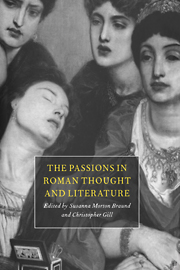Book contents
- Frontmatter
- Contents
- Preface
- Conventions
- Introduction
- 1 Epicurean anger
- 2 Cicero and the expression of grief
- 3 The subjugation of grief in Seneca's Epistles
- 4 A passion unconsoled? Grief and anger in Juvenal Satire 13
- 5 Passion, reason and knowledge in Seneca's tragedies
- 6 Imagination and the arousal of the emotions in Greco-Roman rhetoric
- 7 Pity, fear and the historical audience: Tacitus on the fall of Vitellius
- 8 All in the mind: sickness in Catullus 76
- 9 Ferox uirtus: anger in Virgil's Aeneid
- 10 ‘Envy and fear the begetter of hate’: Statius' Thebaid and the genesis of hatred
- 11 Passion as madness in Roman poetry
- Bibliography
- Index of ancient passages
- General index
11 - Passion as madness in Roman poetry
Published online by Cambridge University Press: 18 December 2009
- Frontmatter
- Contents
- Preface
- Conventions
- Introduction
- 1 Epicurean anger
- 2 Cicero and the expression of grief
- 3 The subjugation of grief in Seneca's Epistles
- 4 A passion unconsoled? Grief and anger in Juvenal Satire 13
- 5 Passion, reason and knowledge in Seneca's tragedies
- 6 Imagination and the arousal of the emotions in Greco-Roman rhetoric
- 7 Pity, fear and the historical audience: Tacitus on the fall of Vitellius
- 8 All in the mind: sickness in Catullus 76
- 9 Ferox uirtus: anger in Virgil's Aeneid
- 10 ‘Envy and fear the begetter of hate’: Statius' Thebaid and the genesis of hatred
- 11 Passion as madness in Roman poetry
- Bibliography
- Index of ancient passages
- General index
Summary
… Aeneas stopped his right hand; and now, now Turnus' speech had begun to affect him and make him pause, when he was struck by the unhappy baldric of Pallas … when he drank in the spoils that reminded him of his savage grief (saeui monimenta doloris), then, inflamed by fury and terrible in his anger (furiis accensus et ira | terribilis), … boiling (feruidus), he buried the sword full in Turnus' breast. (Virgil, Aeneid 12.945–51)
Introduction
The passage cited above, Aeneas' killing of Turnus at the end of Virgil's Aeneid, has served in recent years as a focus for debate on the project which is central to this volume. The project is that of trying to place the representation of the passions in Roman literature in its contemporary intellectual context, in a way that can help to inform our interpretative responses to this representation. In this chapter, my contribution to this debate is to highlight a pattern in Roman poetry to which the killing of Turnus seems (at least partly) to belong, and to explore the shaping influences on this pattern. The pattern that I have in view is one in which the figure's surrender to emotional forces, following inner conflict (in some cases, ‘akratic’ self-surrender), generates a certain kind of madness. This kind of madness is not the ‘raving’ insanity, involving fundamental changes in physical state and perception, that is a recurrent feature of, instance, Greek tragedy, but a more fully psychologised, and moralised, madness. The state of mind involved is marked, in general, by violent, often fluctuating emotion, and sometimes by defective or strained reasoning and miscommunication with other people.
- Type
- Chapter
- Information
- The Passions in Roman Thought and Literature , pp. 213 - 241Publisher: Cambridge University PressPrint publication year: 1997
- 17
- Cited by

